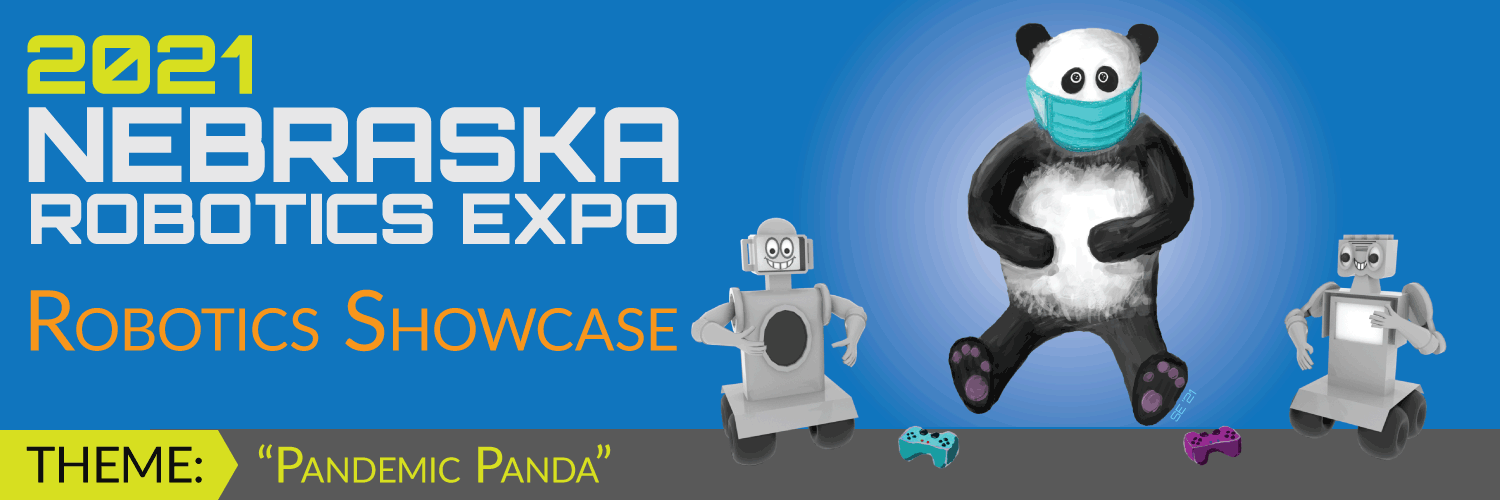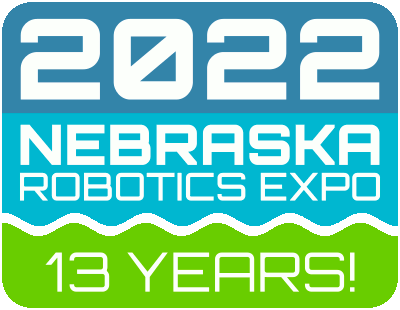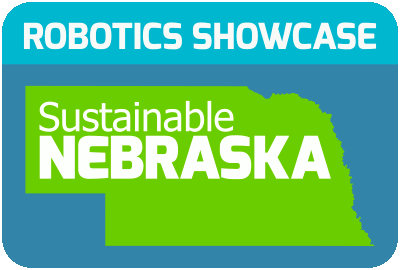Nebraska Robotics Expo 2021 Event
Place: Online / Virtual
Date: Saturday, April 10, 2021
Time: 10am - 2pm
Showcase/NRE Registration for SPIRIT and STEAM Teachers:
-
Virtual Nebraska Robotics Expo Registration
Saturday, April 10th, 2021, 10am - 2pm
Visit this link to register for free tickets to the Virtual NRE! - Sprint Registrations & Info: Sprint #1 / Sprint #2 / Sprint #3 / Sprint #4 / Sprint #5
- Art Teachers: See Sprint #2 for the Virtual CVAE
General Showcase/NRE Information:
About NRE 2021:

Theme: "Pandemic Panda"
This year the Nebraska Robotics Expo will be held virtually. Various challenges or events will take place virtually from January to April, and will be completed using any materials available to you (pen & paper, existing robots, tablets or computers, 3D printers, etc.) with a culminating virtual conference on Saturday, April 10, 2021. National Robotics Week will be celebrated April 3rd - 11th, 2021. The challenges for the expo will focus on STEAM (science, technology, engineering, arts and mathematics), coding, and robotics. The focus for each challenge will be on the engineering design process and learning that takes place throughout the event. Each event will require the participant to create a brief presentation detailing their learning and completed challenge.
This year the challenges are open to any and all types of robots, platforms, materials and resources you have available to meet the diverse needs and requirements of students. Robots may be used, but are not required for all challenges. Any robot or coding platform/language may be used to complete the challenges. Each submission should match the skill level of the participant, allowing novice and returning participants to compete. Facilitators and coaches can help challenge individual participants/ teams to push themselves based on skill level.
Each challenge will require students to upload a short presentation overviewing their learning process, demonstrating their product and/or sharing their documentation via Flipgrid. Users must have a Microsoft or Google email. Students may record their video submission using Flipgrid or any other audio visual (iMovie, Apple Clips, etc.) and then upload to Flipgrid. Participants will be able to view other students submissions, like and comment to create an opportunity for virtual collaboration.
We know that the COVID-19 health situation has brought challenges to us all. We hope that by extending the timeline, moving to a virtual platform and broadening the challenges to utilize more diverse materials and customization we will open the Nebraska Robotics Expo to any and all students who wish to participate.
Sprint Events:
Teacher/Sponsor Registration Link: Sprint #1 Registration Form
Flipgrid Info: Flipgrid Quick Guide
Due Date for Submissions: Friday, February 5th, 2021
Possible Driving Question:
-
- What does STEAM mean to you?
Clarifying Statements:
-
- Participants will use technology to solve a series of questions on an online Breakout EDU
- Breakout EDU link form (use only after you have submitted the Sprint #1 Registration Form above)
Documentation Expectations:
Throughout the challenge, participants should have been utilizing their notebook to document their experience.
-
- Science or Engineering Process must be clearly labeled (Ask, Imagine, Procedure or Plan, Observation, Conclusion, Next Steps)
- Ask: Record the driving question, personal question and/or restate the challenge
- Imagine: Students should record their ideas, research or other ideas
- Plan: Students should record their plan (steps, success criteria, data collection, etc.)
- Test: Participants should record their observations, adjustments, data charts, etc.
- Improve: Students should reflect on their learning. What went well? What were struggles? What are their next steps or lingering questions?
- Date and number each page
- Leave no blank spaces or pages
- Use black or blue pen
- Write neatly using best grammar
- Use text features (diagrams, labels, sketches, captions, etc.)
- Science or Engineering Process must be clearly labeled (Ask, Imagine, Procedure or Plan, Observation, Conclusion, Next Steps)
Presentation Criteria:
Each challenge concludes with a short video presentation to showcase their experience and engineering design process in a 2-3 minute video.
-
- Utilizes and showcases the engineering design process in an organized fashion
- Use relevant, descriptive language and examples to support claims, new understanding or arguments
- Speaks clearly with specific vocabulary and is easily understood
- Camera is focused on speaker, robot or other setup to support the ideas being communicated
- Visuals or demonstrations support the engineering design process, student claim and/or add benefit to the presentation
Teacher/Sponsor Registration Link: Sprint #2 Registration Form
Flipgrid Info: Flipgrid Quick Guide
Due Date for Submissions: Friday, February 12th, 2021
The Creative Visual Arts Expo displays drawing, sculpture, and mixed media works connected to the annual theme of the Nebraska Robotics Expo. This year's theme is Pandas. All projects must include robotic images in some way. Yearly updates, supporting files and more information can be found at the Creative Visual Arts Expo website.
The Event Criteria:
-
- Artwork must be an original creation and include coding or robotics
Clarifying Statements:
-
- Participants may use stencils or any media available to them (3D pen or printer, Photoshop, Laser cutter, markers, oil pastels, etc.)
- Digital Artwork or photographs of sculptures accepted
Documentation Expectations:
Throughout the challenge, participants should have been utilizing their notebook to document their experience.
-
- Science or Engineering Process must be clearly labeled (Ask, Imagine, Procedure or Plan, Observation, Conclusion, Next Steps)
- Ask: Record the driving question, personal question and/or restate the challenge
- Imagine: Students should record their ideas, research or other ideas
- Plan: Students should record their plan (steps, success criteria, data collection, etc.)
- Test: Participants should record their observations, adjustments, data charts, etc.
- Improve: Students should reflect on their learning. What went well? What were struggles? What are their next steps or lingering questions?
- Date and number each page
- Leave no blank spaces or pages
- Use black or blue pen
- Write neatly using best grammar
- Use text features (diagrams, labels, sketches, captions, etc.)
- Science or Engineering Process must be clearly labeled (Ask, Imagine, Procedure or Plan, Observation, Conclusion, Next Steps)
Presentation Criteria:
Each challenge concludes with a short video presentation to showcase their experience and engineering design process in a 2-3 minute video.
-
- Utilizes and showcases the engineering design process in an organized fashion
- Use relevant, descriptive language and examples to support claims, new understanding or arguments
- Speaks clearly with specific vocabulary and is easily understood
- Camera is focused on speaker, robot or other setup to support the ideas being communicated
- Visuals or demonstrations support the engineering design process, student claim and/or add benefit to the presentation
Teacher/Sponsor Registration Link: Sprint #3 Registration Form
Flipgrid Info: Flipgrid Quick Guide
Due Date for Submissions: Friday, February 26th, 2021
This event is based on building or designing a robot. Any robot or coding platform/language may be used to complete the challenge and each submission should match the skill level of the participant.
Possible driving question:
-
- What is a robot?
Possible Products:
-
- Annotated drawn model
- Physical construction of a prototype (non-functioning)
- Physical construction of a robot (functioning)
- Adaptation of an existing robot for a new purpose
Components of a Robot that must be present in any product:
-
- Able to exist in the physical world
- Moves using actuators (muscles) and effectors (hands, claws, wheels, etc.)
- Sensors (proximity, light, sound, etc.)
- Controller (Brain or central processing unit containing code or able to be programmed)
- Purpose (collecting samples, vacuuming, etc.)
Documentation Expectations:
Throughout the challenge, participants should have been utilizing their notebook to document their experience.
-
- Science or Engineering Process must be clearly labeled (Ask, Imagine, Procedure or Plan, Observation, Conclusion, Next Steps)
- Ask: Record the driving question, personal question and/or restate the challenge
- Imagine: Students should record their ideas, research or other ideas
- Plan: Students should record their plan (steps, success criteria, data collection, etc.)
- Test: Participants should record their observations, adjustments, data charts, etc.
- Improve: Students should reflect on their learning. What went well? What were struggles? What are their next steps or lingering questions?
- Date and number each page
- Leave no blank spaces or pages
- Use black or blue pen
- Write neatly using best grammar
- Use text features (diagrams, labels, sketches, captions, etc.)
- Science or Engineering Process must be clearly labeled (Ask, Imagine, Procedure or Plan, Observation, Conclusion, Next Steps)
Presentation Criteria:
Each challenge concludes with a short video presentation to showcase their experience and engineering design process in a 2-3 minute video.
-
- Utilizes and showcases the engineering design process in an organized fashion
- Use relevant, descriptive language and examples to support claims, new understanding or arguments
- Speaks clearly with specific vocabulary and is easily understood
- Camera is focused on speaker, robot or other setup to support the ideas being communicated
- Visuals or demonstrations support the engineering design process, student claim and/or add benefit to the presentation
Teacher/Sponsor Registration Link: Sprint #4 Registration Form
Flipgrid Info: Flipgrid Quick Guide
Due Date for Submissions: Friday, March 12th, 2021
This sprint is focused on building experience with coding. Any robot or coding platform/language may be used to complete the challenge and each submission should match the skill level of the participant.
Possible driving question:
-
- What is code?
The Event Criteria:
-
- Complete at least 10 lines of code containing at least 5 different commands or actions
- Sequences (forward, backward, turn, etc.)
- Loops
- If/Then
- * Any robot or platform is allowed for this sprint
- Complete at least 10 lines of code containing at least 5 different commands or actions
Documentation Expectations:
Throughout the challenge, participants should have been utilizing their notebook to document their experience.
-
- Science or Engineering Process must be clearly labeled (Ask, Imagine, Procedure or Plan, Observation, Conclusion, Next Steps)
- Ask: Record the driving question, personal question and/or restate the challenge
- Imagine: Students should record their ideas, research or other ideas
- Plan: Students should record their plan (steps, success criteria, data collection, etc.)
- Test: Participants should record their observations, adjustments, data charts, etc.
- Improve: Students should reflect on their learning. What went well? What were struggles? What are their next steps or lingering questions?
- Date and number each page
- Leave no blank spaces or pages
- Use black or blue pen
- Write neatly using best grammar
- Use text features (diagrams, labels, sketches, captions, etc.)
- Science or Engineering Process must be clearly labeled (Ask, Imagine, Procedure or Plan, Observation, Conclusion, Next Steps)
Presentation Criteria:
Each challenge concludes with a short video presentation to showcase their experience and engineering design process in a 2-3 minute video.
-
- Utilizes and showcases the engineering design process in an organized fashion
- Use relevant, descriptive language and examples to support claims, new understanding or arguments
- Speaks clearly with specific vocabulary and is easily understood
- Camera is focused on speaker, robot or other setup to support the ideas being communicated
- Visuals or demonstrations support the engineering design process, student claim and/or add benefit to the presentation
Teacher/Sponsor Registration Link: Sprint #5 Registration Form
Flipgrid Info: Flipgrid Quick Guide
Due Date for Submissions: Friday, March 26th, 2021
This sprint is focused on the balance of objects.
Possible driving question:
-
- What is balance?
The Event Criteria:
-
- Balance objects on a seesaw and maintain balance for at least 10 seconds
- Ideas (any setup is allowed):
- Teeter-totter with robot (programmed or driven)
- Matchbox car and ruler with a can
- Ruler, paper towel roll, and ball
- A pan balance with various objects
Documentation Expectations:
Throughout the challenge, participants should have been utilizing their notebook to document their experience.
-
- Science or Engineering Process must be clearly labeled (Ask, Imagine, Procedure or Plan, Observation, Conclusion, Next Steps)
- Ask: Record the driving question, personal question and/or restate the challenge
- Imagine: Students should record their ideas, research or other ideas
- Plan: Students should record their plan (steps, success criteria, data collection, etc.)
- Test: Participants should record their observations, adjustments, data charts, etc.
- Improve: Students should reflect on their learning. What went well? What were struggles? What are their next steps or lingering questions?
- Date and number each page
- Leave no blank spaces or pages
- Use black or blue pen
- Write neatly using best grammar
- Use text features (diagrams, labels, sketches, captions, etc.)
- Science or Engineering Process must be clearly labeled (Ask, Imagine, Procedure or Plan, Observation, Conclusion, Next Steps)
Presentation Criteria:
Each challenge concludes with a short video presentation to showcase their experience and engineering design process in a 2-3 minute video.
-
- Utilizes and showcases the engineering design process in an organized fashion
- Use relevant, descriptive language and examples to support claims, new understanding or arguments
- Speaks clearly with specific vocabulary and is easily understood
- Camera is focused on speaker, robot or other setup to support the ideas being communicated
- Visuals or demonstrations support the engineering design process, student claim and/or add benefit to the presentation
Preparation Resources:
Technical FAQ: CEENBoT Commander Software:- GPI Software: CEENBoT Commander
- Workshop (1/20/2018) Presentation
- CEENBoT Firmware Features and Usage on Servo Controller
- Servos (Part 1)
- Claw/Servo Resources (2019)
- How to Comment Code in Commander
- How to Write a Programming Loop
- How to Implement Conditional Branching
- Autonomous Programming Installation and User Guides
Sponsorship:
- For information on sponsorship, please contact Alisa Gilmore at agilmore2@unl.edu.
Special Thanks:
Special thanks goes to Prairie STEM and to the UNO College of Education for their efforts in making the Robotics Showcase and Nebraska Robotics Expo possible for 2021!
Showcase Information:
Coordinator:
Alisa Gilmore
agilmore2@unl.edu
Register by:
See the Showcase Registration section on this page for registration deadlines.


